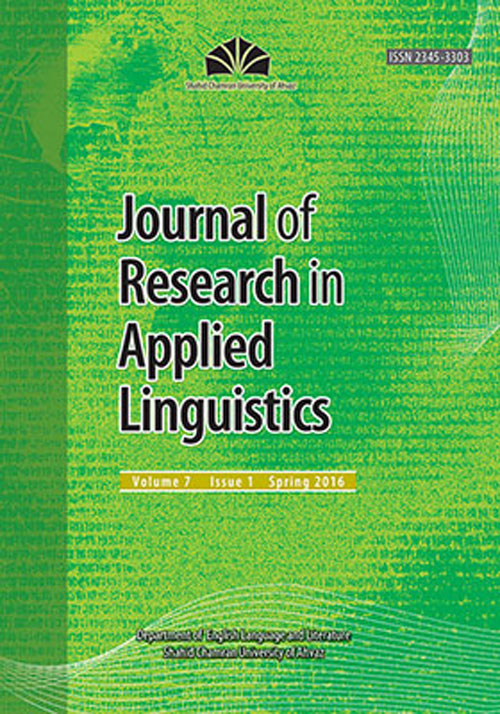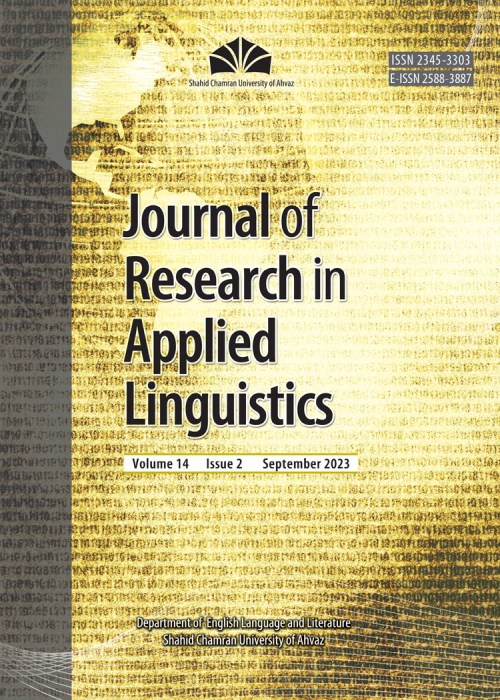فهرست مطالب

Journal of Research in Applied Linguistics
Volume:7 Issue: 1, Winter 2016
- تاریخ انتشار: 1395/03/23
- تعداد عناوین: 7
-
-
Pages 3-29In view of native/nonnative language teacher dichotomy, different characteristics have been assigned to these 2 groups. The dichotomy has been the source of different actions and measures to clarify the positive and negative points of being (non)native teachers. In recent years, many researchers have revisited this dichotomy. The challenge to the dichotomy can be a source of motivation to explore if (non)native language teachers cognitions or belief systems are different. To this end, this study compared the (non)native language teachers perceptions of their cognition in view of their gender and teaching experience. A cognition questionnaire was administered to 66 nonnative and 46 native language teachers, and then an interview was conducted electronically. A total of 12 nonnative and 8 native teachers responded to the interview questions. Results showed a significant convergence between the (non)native language teachers cognitions. Findings also revealed that the (non)native teachers held different beliefs about the nature of language learning and the role of materials in language learning/teaching. As to the teachers gender and teaching experience, it was found that the male (non)native teachers and the low-experienced (non)native teachers showed no significant differences, whereas the female (non)native teachers and the high-experienced (non)native participants differed regarding their perceptions of their cognition. Accordingly, (non)native language teachers dichotomy might need to be revisited in many respects.Keywords: Cognition, Native Language Teachers, Nonnative Language Teachers, Teacher Cognition
-
Pages 30-53We sought to understand whether, how, and why the translated journalistic texts related to the Iranian nuclear negotiations were manipulated. To this end, we monitored a news agencys Webpage in a time span of 46 days that began 3 days before Almaty I nuclear talks and ended 3 days after Almaty II talks. Monitoring resulted in a corpus made up of 36 target texts plus their source texts. Data were, then, approached from the perspective of van Dijks sociocognitive theory of discourse and ideology. Findings indicated that the published texts in the name of translation, as Their voice, were exploited to emphasize in-group favoritism and out-group derogation. Linking the textual analysis to the context demonstrated that the manipulations might have intentionally been done so that the translations conformed to the narratives of resistance and independence prevailing in the country after the 1979 Revolution. Results seem to suggest that manipulated translation can be a more effective tool of manipulation because it is, most of the time, presented and accepted as proxy for what out-groups say.Keywords: Journalistic Translation, Manipulation, Ideology, Discourse Analysis
-
Pages 54-74Improvement in the quality of teacher education is an issue of considerable concern to every country including Iran. The challenges that student-teachers face during their education can be highly influential in this regard. Consequently, the present study was an attempt to come up with a model for the factors challenging Iranian EFL preservice teachers using a grounded theory approach. For this purpose, 30 TEFL M.A. candidates were interviewed individually and in focus groups, and the elicited responses were transcribed and coded using the 3 codification processes of open, axial, and selective codings. Findings revealed 6 major challenges: (a) problems with teachers, (b) lack of educational facilities and amenities, (c) financial problems, (d) problems with educational planning and curriculum development, (e) problems with peers, and (f) personal and social problems. Findings are discussed, and pedagogical implications and suggestions are presented, too.Keywords: Teacher Education, Challenges, Grounded Theory, EFL M.A. Candidates
-
Pages 75-94The current study examined the correlation among Iranian EFL learners emotional intelligence (EI), critical thinking (CT) ability, and L2 vocabulary knowledge (VK). To this end, surveys were administered to 75 Iranian advanced EFL participants. Analyses of the data revealed a mutual relationship between the Iranian EFL learners EI and their L2 VK. Similarly, a positive correlation was found between their CT ability and L2 VK. Additionally, it was revealed that some components of EI enjoy a robust role in predicting the participants L2 VK. Finally, gender was found not to impact the correlation between the participants CT ability and their L2 VK. Findings suggest that EFL instructors might reserve a good space in their programs to further nourish and build features of EI and CT ability in the future generations of their L2 learners.Keywords: Emotional Intelligence (EI), Critical Thinking (CT) Ability, L2 Vocabulary Knowledge (VK), EFL Learners
-
Pages 95-117This study reports a mixed methods design investigation into language teachers conception of research. The study drew on various sources of data, including teachers responses to questionnaires items, qualitative comments in follow-up interviews, and contributions to e-mail inquiries. Results showed that the teachers understanding of research is mainly associated with a standard view of research. From the teachers perspectives, key elements of research include the existence of a priori research questions, objectives and rigorous data, a large number of participants, and the use of statistics for the analysis of results. Findings also pointed to the teachers consensus on the idea that educational research must address practical problems and have pedagogical implications. In addition, the teachers seemed to see research as a producer of new knowledge, an activity that will result in discovering and offering new pedagogical alternatives. The study concludes with the discussion of the underlying factors that have shaped the teachers views of research.Keywords: Educational Research, Iranian EFL Teachers, Research Engagement, Research, Practice Gap, Teacher's Conception
-
Pages 118-137This study investigated the effect of applying the dynamic system theory (DST) and cognitive linguistics (CL) insights into grammar instruction on EFL learners learning of English prepositions and learner autonomy. Sixty Iranian EFL learners at the lower-intermediate level of language proficiency were randomly assigned to 1 experimental and 1 control group. The 2 groups filled out an autonomy questionnaire and took a test of preposition measuring their knowledge of on, over, around, for, and under. Then, the experimental group received a DST/CL-based instruction using image-schemas, whereas the control group followed a traditional approach of repetitions, drills, and substitutions for teaching of the same prepositions. Finally, to examine the effectiveness of the DST/CL-based program, the 2 groups were given the posttests of preposition and learner autonomy. Based on the results, the experimental group outperformed the control group on the test of prepositions, but did not show significant differences regarding the perception of learner autonomy. This indicates that the DST/CL-based approach which relies on meaningful motivation of explicit and underlying levels of interactions leads to better retention and learning of prepositions, but may not contribute to learner autonomy if practiced for a limited period of time.Keywords: Grammar Instruction, Dynamic System Theory (DST), Cognitive Linguistics (CL), Preposition, Learner Autonomy
-
Pages 138-157There is considerable agreement among linguists that thematic analysis offers writers insights into manuscripts that may be rejected by international journals due to thematic organization problems. Whereas many comparative studies have provided valuable information about thematic progression (TP), the role of peripheral themes (PTs) has almost been neglected. Using the revised model of the TP proposed by McCabe (1999), this study incorporated a corpus of 32 experimental RAs, aiming to find out the possible similarities/differences in exploiting the PTs between the ELT RAs of local and international journals. Analysis revealed that different types of PTs were exploited in both samples, and their frequencies were fairly similar. These similarities were justified by the fact that the sample papers represented the shared genre. Results also suggested that PTs should not be considered as marginal themes, but as crucial ones that introduce, organize, and summarize topics.Keywords: Thematic Progression (TP), Peripheral Theme (PT), ELT Journals


